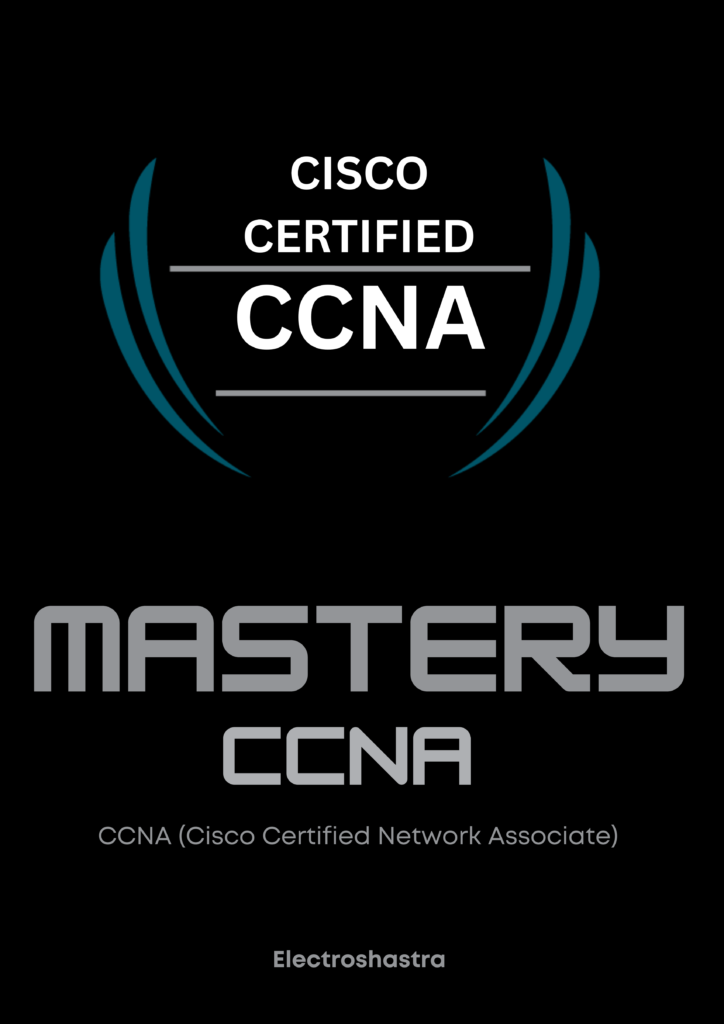CCNA – Cisco Certified Network Associate Training
Course Description
The CCNA (Cisco Certified Network Associate) course is designed to equip you with the fundamental networking skills needed to configure, troubleshoot, and secure modern networks. Covering networking basics, routing & switching, IP addressing, security, automation, and wireless technologies, this course prepares you for the CCNA 200-301 certification exam.
With hands-on labs and real-world scenarios, you’ll gain practical experience in configuring Cisco routers & switches, managing network infrastructure, and implementing security best practices.
What You’ll Learn
- Networking Fundamentals – OSI model, IP addressing, subnetting
- Routing & Switching – Configuring Cisco routers & switches (RIP, OSPF, VLANs)
- Wireless Networking – WLANs, access points, and security protocols
- Network Security – Firewalls, ACLs, VPNs, and authentication methods
- Automation & Programmability – Network automation with Python & APIs
- Troubleshooting & Best Practices – Diagnosing and resolving network issues
Who Should Enroll?
- Aspiring Network Engineers & Administrators
- IT Professionals Seeking Cisco Certification
- Cybersecurity & Cloud Computing Enthusiasts
About this course:
Beginners
Flexible Timing
8-10 Weeks
Theory + Hands-on Labs + Real-World Case Studies
CCNA Modules
Key Topics:
- Network Components:
- Routers, switches, firewalls, access points, endpoints, servers.
- Network Topologies & Architectures:
- LAN, WAN, SDN, cloud, on-premises, SOHO.
- OSI & TCP/IP Models:
- Layer-wise functions, encapsulation, and real-world examples.
- IPv4 & IPv6 Addressing:
- Subnetting (VLSM, CIDR), ARP, ICMP, EUI-64, address types (unicast, multicast, anycast).
- Ethernet & Wireless Basics:
- MAC addresses, CSMA/CD, Wi-Fi standards (802.11ac/ax), cabling (UTP, fiber).
Key Topics:
- Switching Concepts:
- VLANs (native, data, voice), trunking (802.1Q), DTP.
- Spanning Tree Protocol (STP):
- STP, RSTP, PVST+, MSTP, BPDU guard, root bridge election.
- EtherChannel & LACP:
- Static vs. dynamic (PAgP/LACP), load balancing.
- Wireless Networks:
- SSID, RF channels, WLAN security (WPA2, WPA3, EAP).
- Switch Port Security:
- Port-security, MAC address filtering, DHCP snooping.
- Switching Concepts:
Key Topics:
- Routing Fundamentals:
- Static vs. dynamic routing, administrative distance, metrics.
- IPv4 & IPv6 Static Routing:
- Configuration, default routes, floating static routes.
- OSPF (v2 for IPv4, v3 for IPv6):
- Single-area OSPF, neighbor adjacency, DR/BDR election.
- First Hop Redundancy Protocols (FHRP):
- HSRP, VRRP, GLBP (comparison and use cases).
- Routing Fundamentals:
Key Topics:
- DHCP (v4 & v6):
- Configuration on routers, DHCP relay, DHCP snooping.
- NAT (Network Address Translation):
- Static NAT, dynamic NAT, PAT (NAT overload).
- NTP (Network Time Protocol):
- Stratum levels, NTP client/server configuration.
- QoS Basics:
- Traffic marking (DSCP, CoS), queuing (FIFO, LLQ).
- Other Services:
SNMP (v2c/v3), Syslog, FTP/TFTP, DNS, HTTP/HTTPS.
Key Topics:
- Security Threats & Mitigation:
- Malware, DDoS, social engineering, zero-day exploits.
- Access Control:
- Standard & extended ACLs (IPv4/IPv6), named ACLs.
- AAA Framework:
- RADIUS vs. TACACS+, authentication methods.
- VPNs & Wireless Security:
- Site-to-site VPN (IPSec), remote-access VPN (SSL), WPA3.
- Layer 2 Security:
- Port security, BPDU guard, root guard, dynamic ARP inspection.
Key Topics:
- Network Automation Benefits:
- APIs, SDN (Software-Defined Networking), intent-based networking.
- Cisco DNA Center & SD-Access:
- Overview of Cisco’s enterprise networking solutions.
- Data Formats & APIs:
- JSON, XML, REST APIs (GET/POST/PUT).
- Configuration Management Tools:
- Ansible, Puppet, Chef (high-level concepts).
- Python for Networking:
- Basic scripting (SSH, Netmiko, Paramiko).
IAC Security Project:
📖 Final Exam:
Multiple-choice theory assessment
Hands-on practical challenge: Capture the Flag (CTF)
📜 Certification of Completion upon passing the final assessment.
Common Questions
Frequently Asked Questions (FAQ) – CCNA
CCNA (Cisco Certified Network Associate) is a globally recognized certification that validates your ability to install, configure, operate, and troubleshoot small to medium-sized networks.
- Aspiring Network Engineers & Administrators
- IT Professionals looking to enhance networking skills
- Those preparing for higher Cisco certifications (CCNP, CCIE)
- Cybersecurity professionals seeking network security knowledge
- Networking Fundamentals (OSI Model, TCP/IP, Subnetting)
- Routing & Switching (VLANs, OSPF, EIGRP, NAT)
- Wireless Networking (WLANs, Access Points, Security)
- Network Security (ACLs, Firewalls, VPNs, Authentication)
- Automation & Programmability (Python, APIs, SDN)
Yes! CCNA is designed for both beginners and IT professionals. However, basic knowledge of networking concepts can be helpful.
On average, 2 to 4 months of dedicated study is recommended, depending on prior experience.
- Exam Code: CCNA 200-301
- Duration: 120 minutes
- Questions: 100-120 (Multiple-choice, simulations, drag & drop)
- Passing Score: Varies (~800-850/1000)
Yes! Practical labs using Packet Tracer, GNS3, or real Cisco devices help reinforce networking concepts.
Yes, the CCNA certification is valid for 3 years. You can renew it by passing a higher-level exam or earning Continuing Education (CE) credits
CCNA-certified professionals can work as:
- Network Engineer
- Network Administrator
- IT Support Engineer
- Cybersecurity Analyst
Yes! The CCNA 200-301 exam can be taken online via Pearson VUE or at a certified testing center.
The CCNA 200-301 exam costs $300 USD (excluding taxes), but prices may vary based on location.
There are no formal prerequisites for CCNA, but a basic understanding of networking concepts, IP addressing, and IT fundamentals can be helpful.

Classroom Traning
We offer customized VILT (Virtual Instructor-Led Training) sessions at your convenient hours to provide effortless training.

Online Training Class
One can also opt for the prerecorded video sessions available at any point of time from any particular location.

Corporate Training
Hire a preferred trainer at your work premises at your chosen time slots and train your employees with full efficiency.


